Pakistan, UN disappointed by Indian response to Kashmir report
OHCHR shoots down Indian claims of the report being a 'Pakistan authored' conspiracy
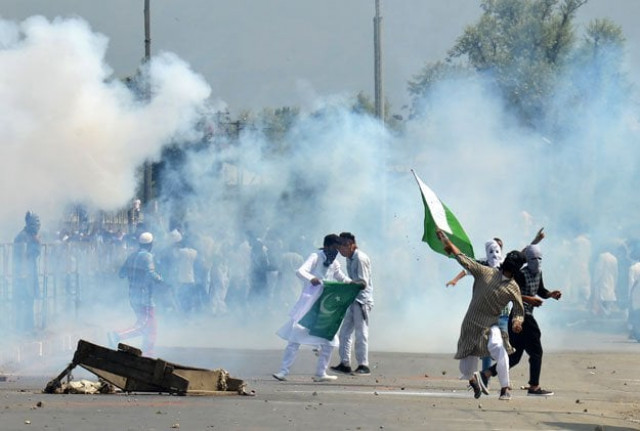
Indian forces hurl tear gas at Kashmiri protesters in Sringar. PHOTO: AFP/FILE
In a series of tweets, Foreign Office Spokesperson Dr Mohammad Faisal said the report issued by the Office of the United Nations High Commissioner for Human Rights (OHCHR) had quoted Indian sources including their Parliament, Supreme Court and Ministry of External Affairs.
UN denies Indian allegations on #Kashmir report. Deeply disappointed by India dismissing the report without examining it. 1/6
— Ministry of Foreign Affairs - Pakistan (@ForeignOfficePk) July 18, 2018
“India failed to address the very serious concerns raised by OHCHR in Kashmir report about the grave human rights situation in IOK.”
After it was published, the Indian government and media termed the report as “Pakistan authored” and a “nefarious conspiracy” against India. However, the allegations were shot down by the OHCHR. “The report was developed through remote monitoring,” it said in a statement.
UN report confirms Indian brutality in occupied Kashmir, says FO
“Since the report was published, we have been deeply disappointed by the reaction of the Indian authorities, who dismissed the report as fallacious, tendentious and motivated without examining it and responding to the very serious concerns about the human rights situation.”
It also denied claims that a Canada-based imam of Pakistani descent, Zafar Bangash, was in constant touch with the UN high commissioner, making the inference that Bangash influenced the content of the report.
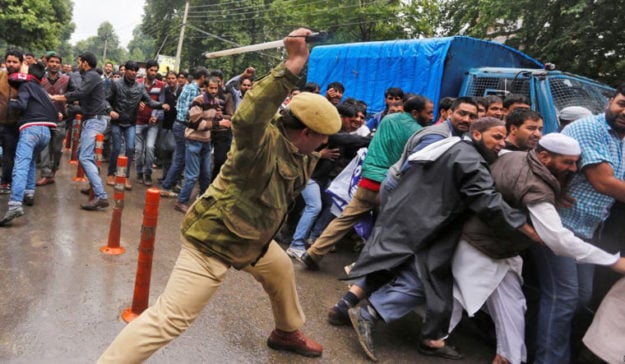 A police personnel canning protesters during a demonstration in Srinagar. PHOTO: REUTERS
A police personnel canning protesters during a demonstration in Srinagar. PHOTO: REUTERS“This is totally untrue. The High Commissioner has never spoken with Bangash, and we are not aware of receiving any information from him, let alone using it, although it is possible he sent an email or letter and received a polite acknowledgment, as is the case with thousands of letters and emails sent to the Office of the High Commissioner for Human Rights.”
The OHCHR report on Kashmir
The Kashmir report reveals “impunity for human rights violations and lack of access to justice” to be human rights challenges in the Indian-occupied Kashmir (IoK).
“Special laws in force in the state, such as the Armed Forces Special Powers Act, 1990 (AFSPA) and the Jammu and Kashmir Public Safety Act, 1978 (PSA) have created structures that obstruct normal course of law, impede accountability and jeopardise the right to remedy for victims of human rights violations.”
According to the report, over 1,000 people were detained under PSA between March 2016 and August 2017 including minors. “During the 2016 unrest, there were numerous reports of attacks on and obstruction of basic medical services that had a severe impact on the injured and general civilian population in IoK.”
Days-long curfews and communication blockades had a cumulative impact on students and their right to education. In 2016, the authorities imposed restrictions on freedom of expression by targeting the media and journalists, it added.
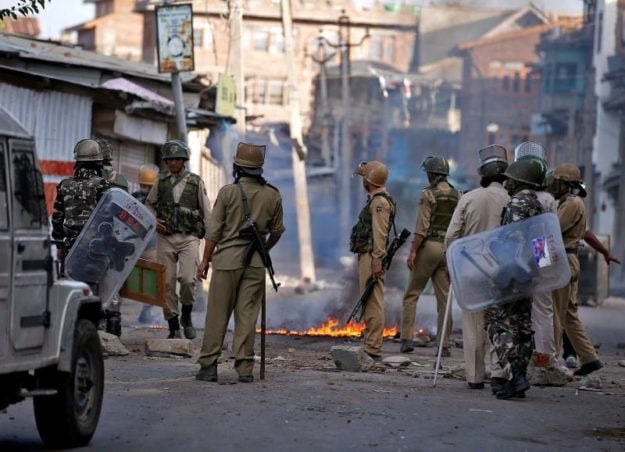 Indian policemen stand next to a burning handcart set on fire by demonstrators during a protest in Srinagar against the recent killings in Kashmir, July 18, 2016. PHOTO: REUTERS
Indian policemen stand next to a burning handcart set on fire by demonstrators during a protest in Srinagar against the recent killings in Kashmir, July 18, 2016. PHOTO: REUTERSThe OHCHR also revealed continued impunity for enforced disappearances with “little movement towards a credible investigation of complaints including inquiry into alleged sites of mass graves”. It added that the Indian authorities failed to independently investigate and prosecute allegations of sexual violence by security forces personnel.
The report also found that Indian military courts and tribunals were a hindrance to justice and highlighted administrative detention used by the Indian authorities in IOK to “circumvent the protections of ordinary criminal procedure. Introduced in 1978 to primarily deal with timber smugglers, the Jammu and Kashmir Public Safety Act, 1978 (PSA) is the most commonly used law for the purpose of administrative detention".
The excessive use of force by Indian forces in held-Kashmir was also stressed in the report. “The killing of civilians between 2016 and 2018 raises the question of whether security forces resorted to excessive use of force to respond to protesters, some of whom were throwing rocks. International human rights groups have accused Indian security forces of using excessive force and failing to adhere to applicable national and international standards on the use of force,” it said.
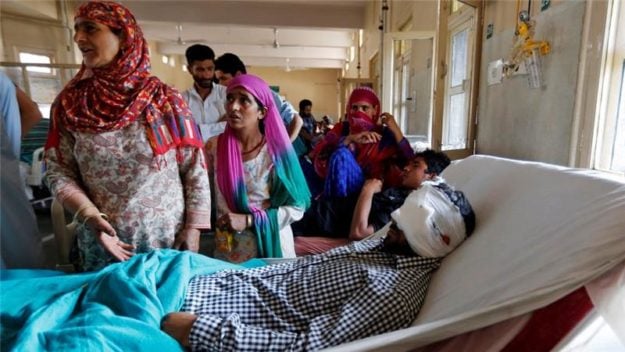 A man injured by a pellet gun lies in a Kashmir hospital. PHOTO: REUTERS
A man injured by a pellet gun lies in a Kashmir hospital. PHOTO: REUTERS“Civilian killings near armed encounter sites and excessive use of force against protesters continued sporadically in 2018. These killings triggered several large protests across the Kashmir Valley that included long spells of strikes and demonstrations by college students.”
The Indian government was also criticised for the use of pellet guns. “One of the most dangerous weapons used against protesters during the unrest in 2016 was the pellet firing shotgun, which is a 12-gauge pump action shotgun that fires metal pellets. It was deployed by the Central Reserve Police Force and the Jammu and Kashmir Police against protesters, some of whom were throwing stones.”
Quoting human rights organisations, the report stated that “the shotgun cartridges contain 500 to 600 pellets that resemble ball bearings. The ammunition is made of a lead alloy that is fired at a high velocity thereby dispersing the metal pellets over a large area. Experts claim that there is no way of adequately controlling the trajectory of these shotguns beyond a limited range, which makes them inherently inaccurate and indiscriminate. The pellet firing shotgun was first used in Kashmir during mass protests in 2010; it is not known to have been used against protesters anywhere else in India.”
“Despite the public outrage over the deaths and mass blinding caused by the use of pellet firing shotguns, the state government has only set up one special investigation into a death caused by pellet gun injuries,” it noted.
A UN-backed chance to address the Kashmiri plight
Glaring rights violations have been stressed including arbitrary arrests and detention of children. “As a State party to the International Covenant on Civil and Political Rights, India is obligated to ensure the principles of legality and the right to liberty and security. The right to liberty and security includes the right not to be subjected to arbitrary arrest or detention, the right to know the reasons for one’s detention and charges, if any the right to be brought before a judge within a reasonable time following arrest or detention, and the right to appeal to a court of law to review the arrest or detention.”
The OHCHR noted observed “persistent claims of torture by security forces in Kashmir” including sexual violence. “Authorities have failed to independently investigate and prosecute allegations of sexual violence by security forces personnel. There is no record of allegations of sexual violence by security forces being prosecuted in a civilian court.”
Expressing concern over frequent reports of increasing infringements of the ceasefire agreement since the start of 2018, including shelling and shooting that have resulted in civilian casualties and the forced the displacement of people living along the Line of Control (LOC), the OHCHR recommends that “governments of India and Pakistan to immediately cease all shelling and firing along the LOC and Working Boundary and do all that is reasonable to ensure that the rights of civilians living in these areas are respected and protected”.



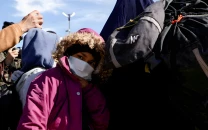

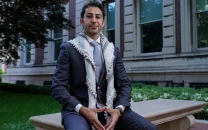













COMMENTS
Comments are moderated and generally will be posted if they are on-topic and not abusive.
For more information, please see our Comments FAQ